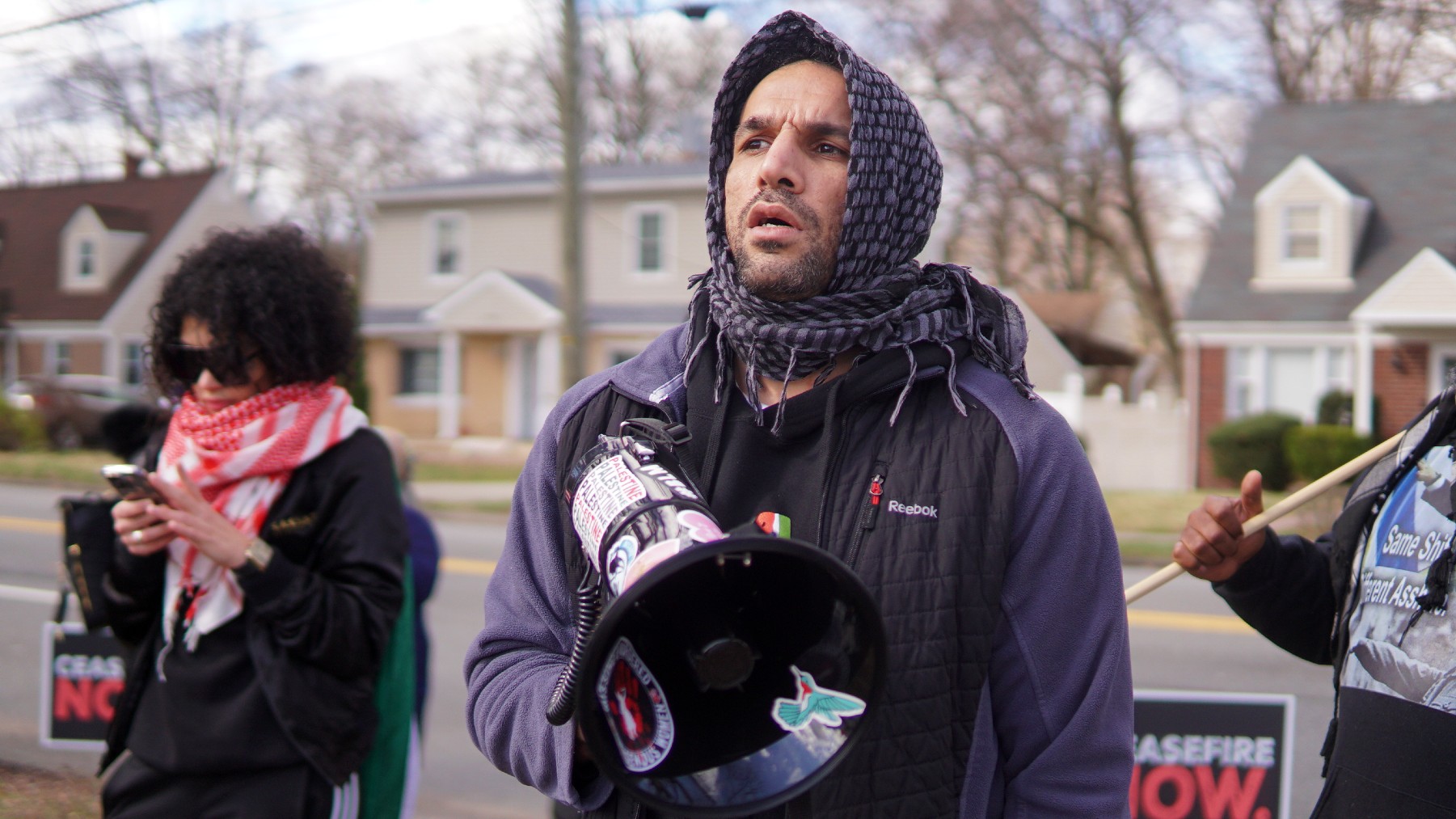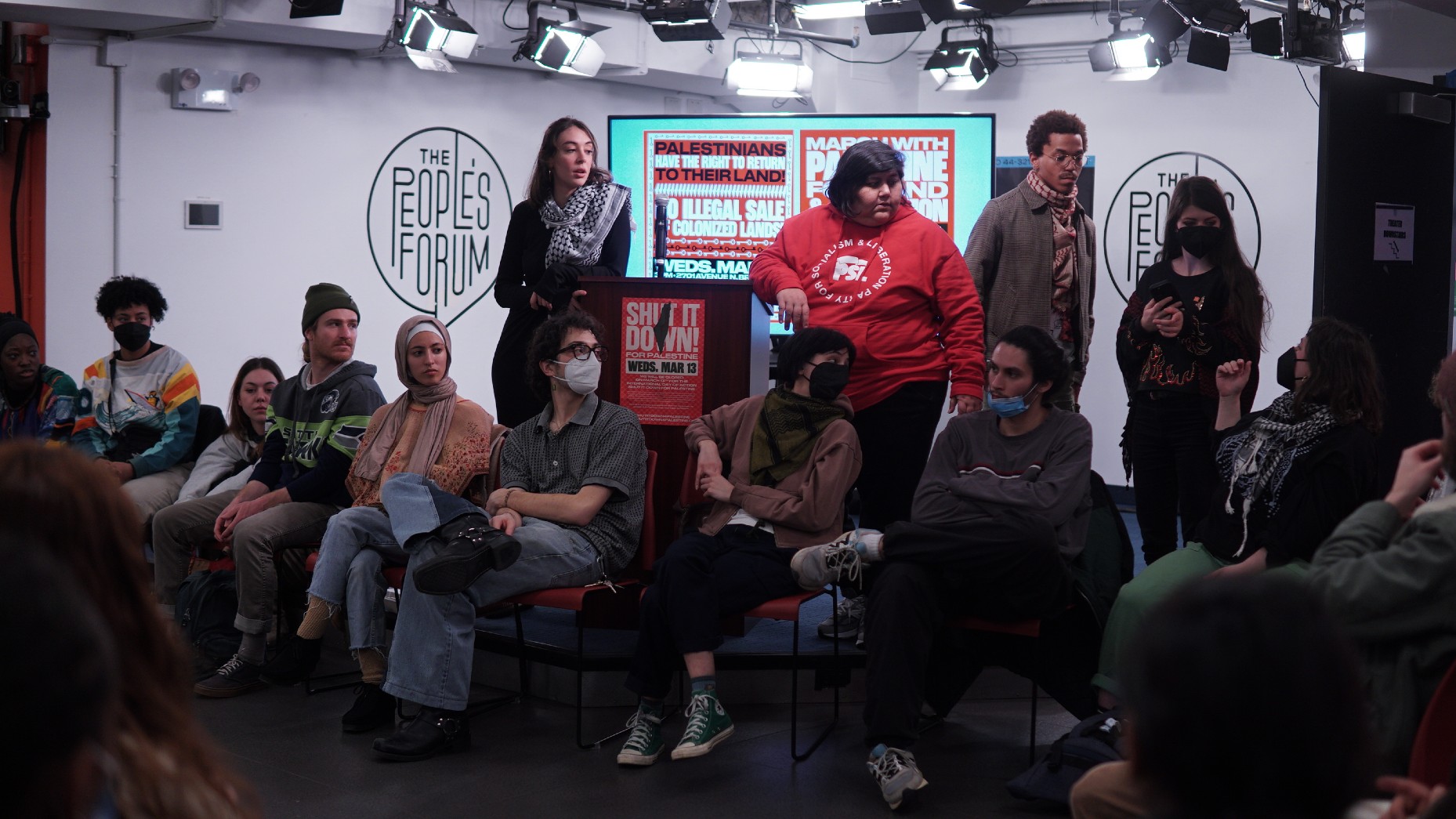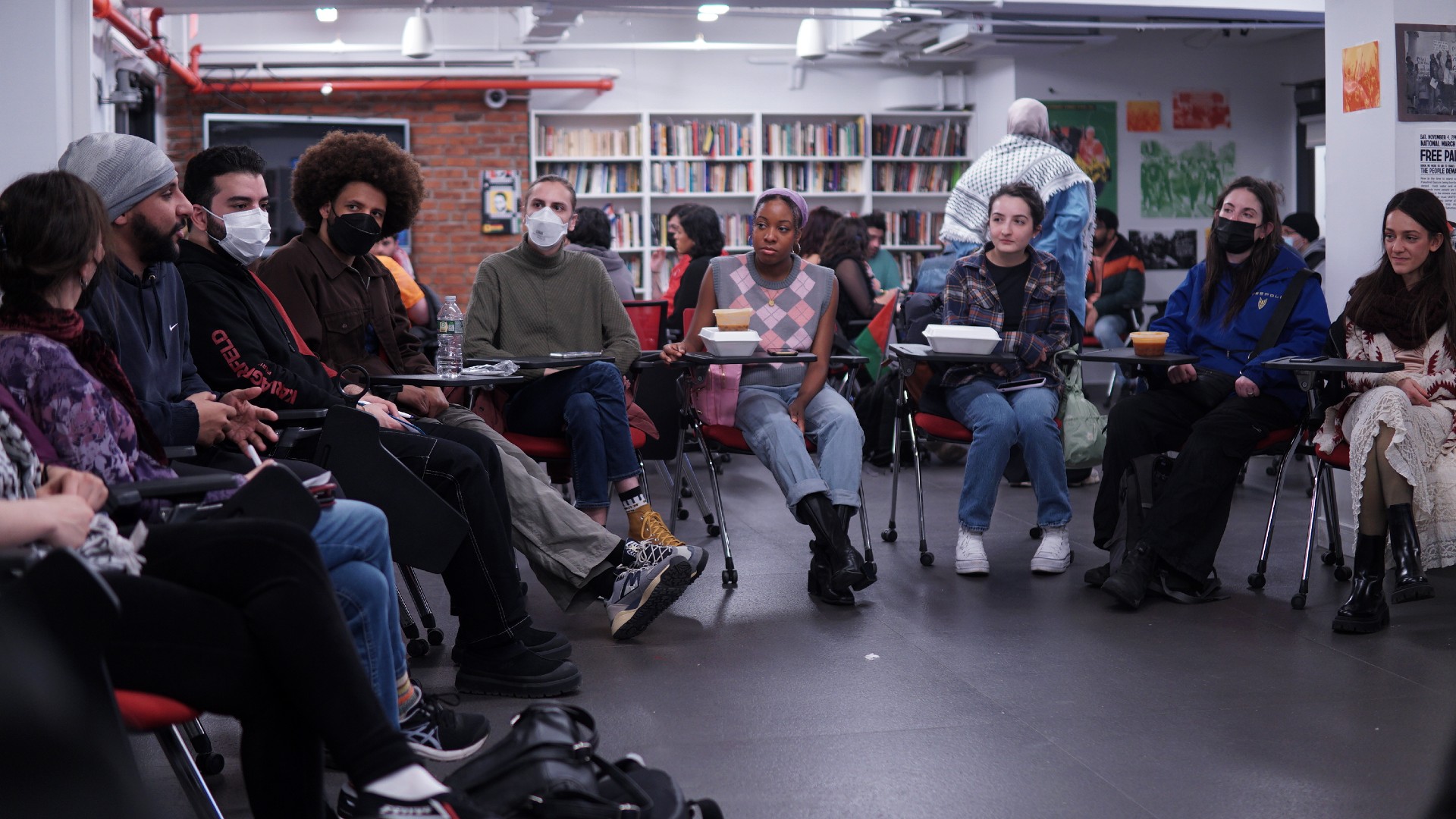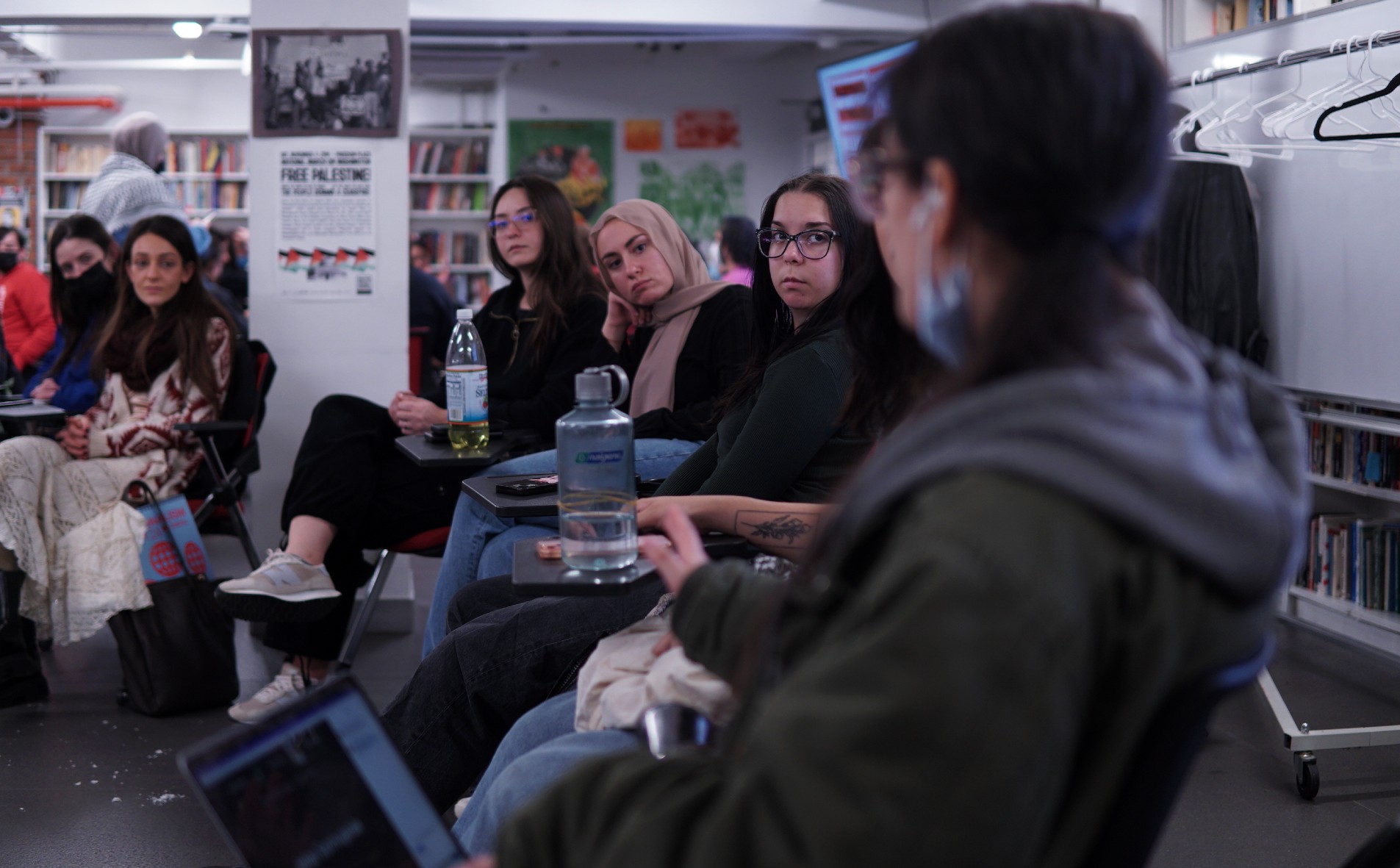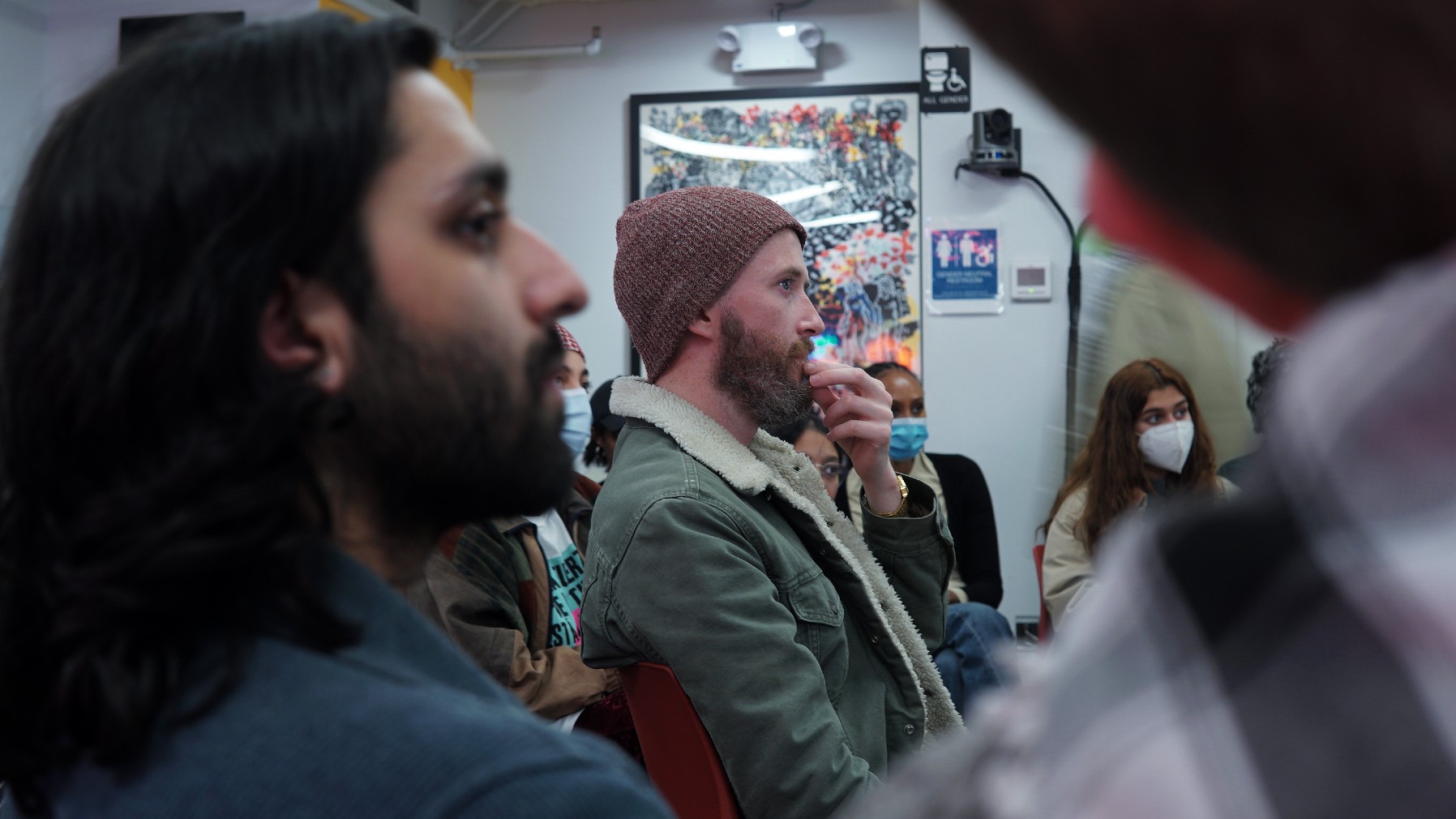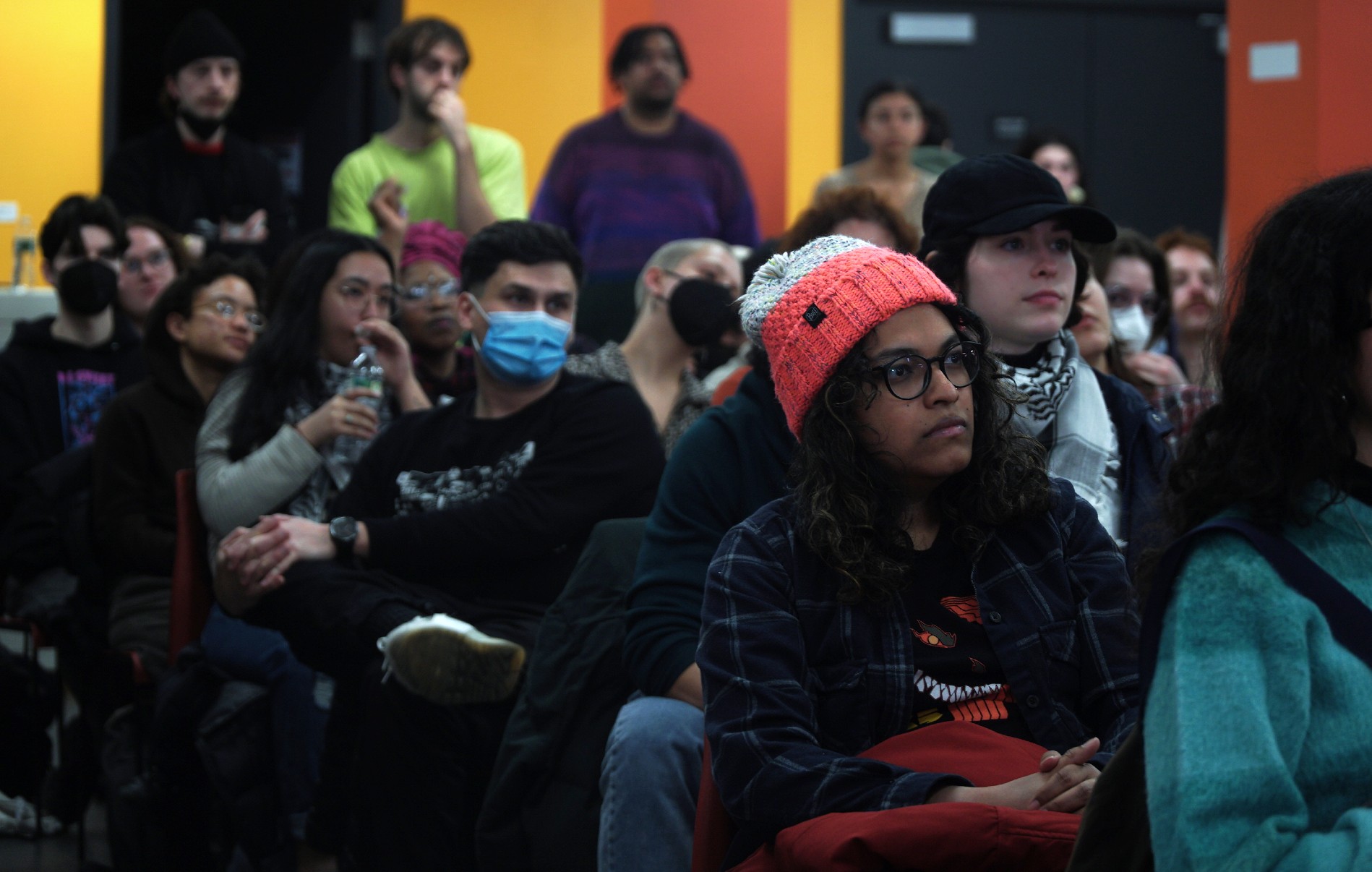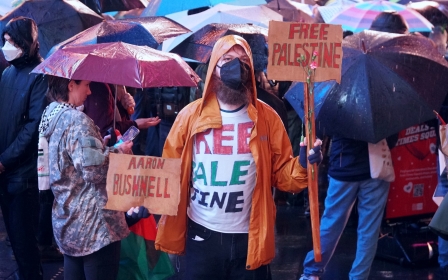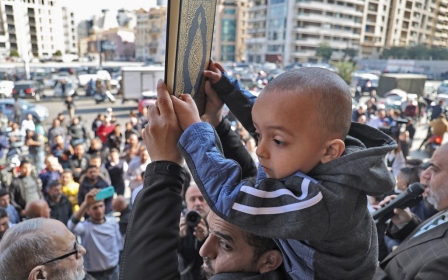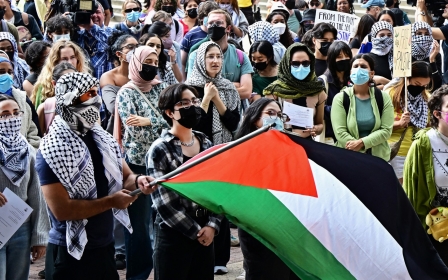How a disparate group of volunteers galvanised pro-Palestine advocacy in NYC
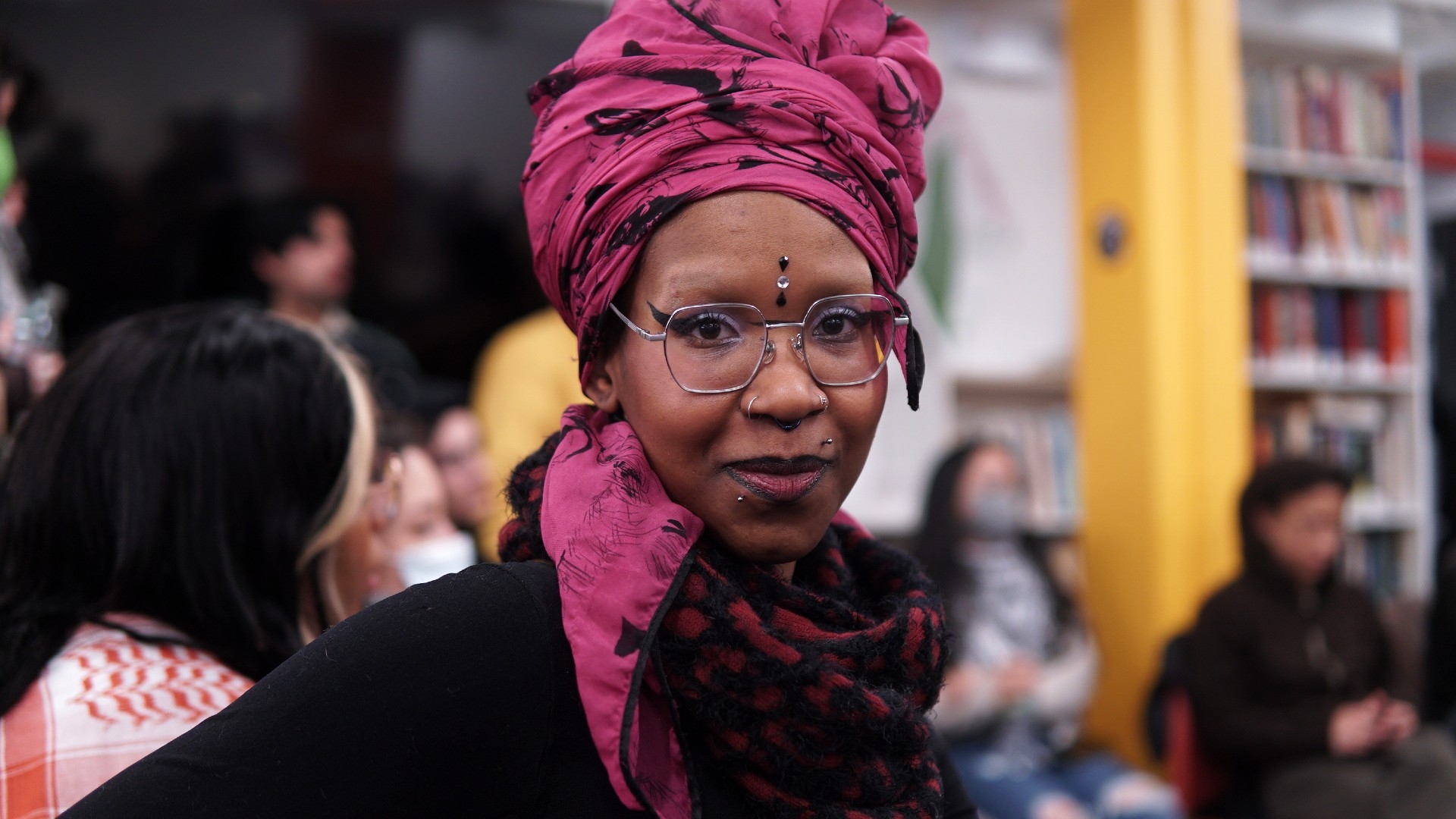
Ziyaad Zeineldine was walking past The People's Forum in New York City one afternoon in November when he spotted a Palestinian flag in a window.
Unaccustomed to seeing Palestinian symbols in midtown Manhattan, he stepped into the sprawling office on 37th Street and discovered one of the city's key hubs for mobilisation and action on Palestine.
The organisers inside invited him to join what they called a "volunteers meeting" the following Monday.
Aggrieved by the devastating loss of life in the war on Gaza - by early November around 10,000 Palestinians, including more than 4,000 children and 2,700 women had already been killed by Israel in the besieged Strip, today it is over 31,000 dead - Zeineldine agreed to return.
In doing so, Zeineldine became part of an army of hundreds of volunteers across the five boroughs in New York as well as across the Hudson River in New Jersey, where Zeineldine lives, making their way each Monday evening to Manhattan to discuss, plan actions, and mobilise others to bring an end to what they say is a "genocide" in Gaza.
Zeineldine has since helped to organise several actions across the city, lending his "obnoxiously loud voice" - as he calls it - to protests.
"I feel a beautiful level of solidarity when I am here," Zeineldine, of Egyptian heritage, told Middle East Eye at a volunteer meeting in March.
"It feels like our souls are connected together in one place. And it gives me a sense of purpose on a weekly basis," he added.
The People's Forum, based in Manhattan, calls itself "a movement incubator" that promotes social and economic equality in the US and across the globe.
According to Layan Fuleihan, education coordinator at The People's Forum, the original impetus for the volunteer meetings came during November's National March to Washington, which saw around 500,000 people descend on the US capital to rally for Palestine.
Having witnessed the level of energy and interest among activists to organise and become involved, Fuleihan said The People's Forum - along with allies like the Palestine Youth Movement, Al Awda: The Palestine Right to Return Coalition, and others - would try to harness these energies across different communities to continue to build a self-sustaining and flourishing movement for Palestine.
Fuleihan said they also recognised that public sentiment towards Palestinians among young Americans was starting to shift during the period, and wanted to build on that.
Still, it wasn't clear how many, if any at all, would respond to the open call for volunteers.
But hundreds arrived. Almost five months later, the numbers are increasing, with each volunteer brimming with ideas and a drive for action.
A number of events in New York City over the past five months were either planned there or brought to life out of the interactions between people coming to the Forum. And it started with the city-wide shutdown of businesses on 17 November.
Volunteers mapped out the city, identifying and approaching businesses to shut down in support of Gaza and Palestinians in the war on the enclave. The shutdown was a resounding success with hundreds of businesses closing their doors.
Since then, the volunteer meetings on Mondays have functioned as a circuit for getting information out, as well as mobilising others to take action: the set of Palestine stickers on the light pole or that poster at a New Yorker's local bodega or bus stop calling for a protest in Manhattan or in Brooklyn; that random person on the street handing out flyers or offering a 90-second pitch for Palestine between stations on the subway, urging people to care and to take to the streets.
"Every week we picked on a new skill. Pickets, door knocking, strikes. They built on other tactics to get the word out and to get more people involved," Fuleihan says.
Many of the more imaginative actions have come from the volunteers themselves.
For one week in November, protesters hung outside Senator Chuck Schumer's house, striking pots and pans at 0430 in the morning local time.
In another action, others camped outside Defence Secretary Lloyd Austin's home on Christmas morning to protest against US military support for Israel.
Not only have the efforts led to effective mobilising, it has led to another outcome: an organising infrastucture.
Over several weeks, MEE observed as hundreds of volunteers descended to the venue each Monday, breaking up into groups based on locality, with sub-groups of students and artists taking shape.
The groups discussed actions from the previous week, successes and failures, and prospects for the coming weeks. They also discussed in detail what would be meaningful action for them to target as a community.
In one meeting, volunteers exchanged ideas on how to approach businesses to put up posters or request them to close their business as part of a city-wide shutdown for Palestine that took place earlier this week.
“Most of the bodegas I have approached understand immediately. I don’t have to say much," one volunteer said.
Another suggests approaching smoke shops.
“Yeah, especially since those are legal now, too,” another replied with a smile.
In another break-out, volunteers would talk about elected officials who need to be held to account - and so disruptions are planned.
The network of volunteers from different backgrounds, some in graphic design or public relations or tech or business management, means a plethora of skill sets.
The volume of people from different localities means there's a ready-made infrastructure of capable and connected volunteers willing to mobilise for Palestine at a moment's notice.
Volunteers describe the interactions as both a way to help them cope with the devastating events around them as well as work towards potentially laying the foundation to put an end to them.
"I find purpose coming here," said Areej Khan with the Palestinian Assembly for Liberation-Al Awda (PAL-Awda) NY/NJ.
"I don't feel like I have done anything with my day until I have done something for Palestine," Khan said.
Another volunteer, who asked to remain anonymous due to her immigration status, told MEE that "as an Arab and a Muslim she felt it was important to show up in the belly of the beast, as we call it".
“We are finding a lot of people are sympathetic to the cause. And I have been organising for a long time and we didn’t see this type of presence for Palestine. If you go to lower-income neighborhoods you will see stickers and posters everywhere; people wearing keffiyehs,” the organiser added.
Others like Janee, a volunteer who only offered her first name, said she felt it was important to be around like-minded people and in a place where she can learn how to better organise for the issues she cares about.
"I feel like I am learning about the history [of Palestine], about the compassion that other people have," Janee, whose family hails from Cuba, told MEE.
Khan agrees.
She says the diverse conversations naturally lead to questions and these questions provide an opportunity for more political education.
"There is a way to support Palestine that is more true to the Palestinians because it's led by them. The political education is from Palestinians, the political messaging is from Palestinians.
"It is not from other people. It is not from allies. It is not from people who think they understand the Palestinian cause. It's directly people talking to people from Gaza and bringing these messages to us," Khan added.
Fadi Quran, a Palestinian campaigner with Avaaz living in the occupied West Bank, who came by one of the open meetings in March, said he was in awe of the level of organising in the city.
"For decades we have felt alone. And watching all of these organisers come together from such different backgrounds, ethnicities, it gives us hope that freedom is possible in this lifetime," Quran told MEE.
New York City has always been a vibrant home to protest and public dissent.
Several other organisations, like Within Our Lifetime (WOL), have also been at the forefront of nonstop direct actions in the city, for months leading daily protests in different locations across the five boroughs.
WOL, led by Palestinian-American Nerdeen Kiswani, has been routinely attacked and censored for their actions in support of Palestine.
Since February, WOL has been permanently banned from Instagram.
Others, like Jewish Voice for Peace (JVP), have arranged several sit-ins, vigils and protests, too.
While the public nature of the meetings at The People's Forum has given unprecedented access to a new generation of activists, thinkers and doers, it has also brought about the prospect of infiltrators and troublemakers looking to destabilise their efforts.
Rallies have also brought several incidents of police repression and intimidation.
The Peoples Forum, along with the activist group Code Pink, has also been accused of being a front for Chinese state-sponsored propaganda.
Organisers say they won't be cowed by what they describe as "the new McCarthyism that is targeting peace activists, critics of US foreign policy, and Chinese Americans".
On Monday, the first day of Ramadan, volunteers stopped and waited for their Muslim colleagues to open their fast, before continuing with their discussions and planning for daily and weekly actions.
The coalition says they are now preparing for a massive protest on 30 March.
The organiser from Brooklyn, who asked to remain anonymous, says the movement has already heightened consciousness.
“One of the things we keep on chanting at protests is that we are all Palestinians. And people in this movement really believe that.”
“Gaza is not just fighting for Gaza. Gaza is fighting for every oppressed person everywhere. And people here know that. And when you fight for Palestine, you are inevitably conscious of other things and have conviction for them,” she added.
Zeineldine, the activist from New Jersey, agrees.
"We are building something here. InshAllah, even after this genocide ends. I don't think this movement will end.
"We are not calling for a ceasefire. We are calling for full liberation. And an end to the occupation. From the River to the Sea," he added.
Middle East Eye propose une couverture et une analyse indépendantes et incomparables du Moyen-Orient, de l’Afrique du Nord et d’autres régions du monde. Pour en savoir plus sur la reprise de ce contenu et les frais qui s’appliquent, veuillez remplir ce formulaire [en anglais]. Pour en savoir plus sur MEE, cliquez ici [en anglais].


